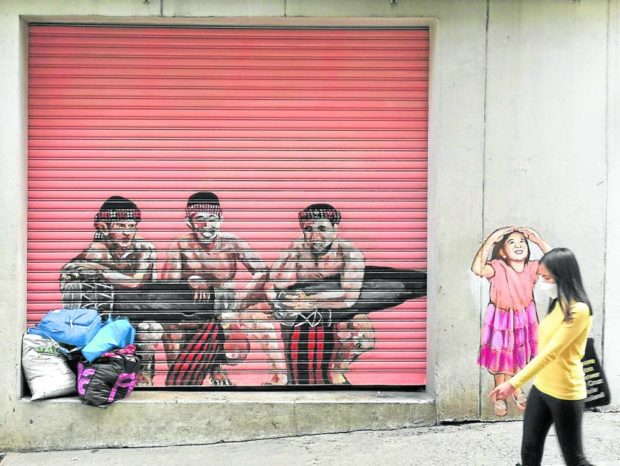
STREET ART Murals put up along Baguio’s major roads and alleys depict the Cordillera’s indigenous peoples and scenes from the local community. Homegrown artists worked on these art pieces to expose visitors to street art and educate them about local culture and way of life. —EV ESPIRITU
BAGUIO CITY, Benguet, Philippines — Leisure travelers entering this city will again be required to show negative COVID-19 test results if they come from areas classified as alert level 3, according to a new directive by Mayor Benjamin Magalong.
This rule will be enforced from Jan. 6 to Jan. 18 and will cover all guests from Metro Manila, which is under alert level 3 from Jan. 3 to Jan. 15, and the provinces of Bulacan, Cavite, and Rizal, which were placed under the same alert level from Jan. 5 to Jan. 15.
Baguio remains under alert level 2, and at least 83,000 prebooked visitors have scheduled trips to this city from January to March 3.
Guests must show negative results from reverse transcription-polymerase chain reaction (RT-PCR) tests that were conducted within 72 hours prior to arrival, or rapid antigen tests conducted within 24 hrs prior to arrival, according to an executive order issued by Magalong on Tuesday.
A tourist may undergo antigen testing upon arrival at duly authorized triage units under the supervision of the City Health Services Office.
Travel companions ages 12 to 17 must also present negative RT-PCR or antigen test results or may undergo testing procedures at the triage regardless of their vaccination status.
Reduced cap
Magalong said the stricter travel guidelines, as well as the return of restrictions for Baguio residents, such as the resumption of curfew from midnight to 4 a.m, will control public movement.
The city government also reduced a daily travel cap for tourists allowed to enter the city borders by 1,000.
Baguio’s daily travel cap used to be 5,000 based on the city’s capacity to examine each visitor at the medical triage set up for tourists. The triage network has been expanded to include triage set up by more than 40 hotels.
Only fully vaccinated tourists have been allowed to enter the summer capital after the city government again opened the borders to leisure travel in November last year.
But the city tourism office suspended all new travel applications on Sunday to allow the government time to take stock of rising active COVID-19 cases in the city.
“Coming from the holiday season, and since Baguio is host to a large number of travelers—both essential and nonessential—there is a likelihood that a case surge will occur in the coming weeks,” Magalong said.
Cases
On Monday, the city’s active COVID-19 cases rose to 95, a gradual increase in transmissions within nine days. On Christmas Day, the city recorded only four patients.
Baguio saw a sustained drop in infections in the last month of 2021 after a spike in September. At one point, hospitals were taking care of 4,000 patients in a day.
That wave of infections raised Baguio’s total cases to 30,109 and its death toll to 721 since the pandemic struck in 2020.
Magalong said the suspension of new applicants through the city’s visitor information and travel assistance portal allows the city government to reinstate measures that would ensure safe travel.
The city’s infections were part of a similar rise in active COVID-19 cases being monitored throughout the Cordillera, which reached 154 as of Monday. Only Abra recorded zero active cases for that period.
Total COVID-19 cases in Cordillera reached 93,248.
Baguio topped the region’s vaccination performance, by fully vaccinating 255,997 (91.1 percent) of its 281,000 target population.